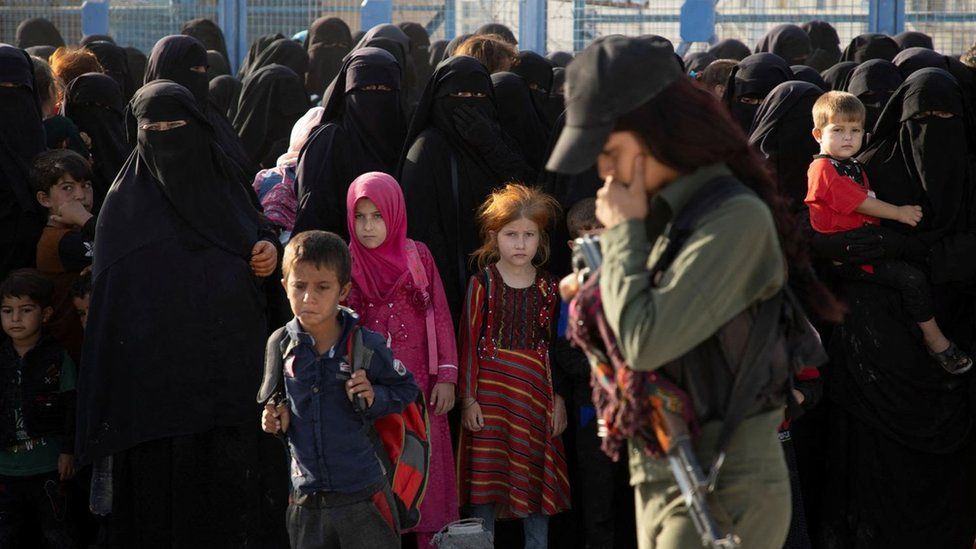Islamic State: Kurdish forces threaten to stop guarding camps
- Published

Local forces in north-east Syria have told the BBC that they may be forced to abandon camps holding Islamic State (IS) group detainees.
The Syrian Democratic Forces (SDF) said they no longer have the capacity to guard the compounds if Turkey launched a fresh ground operation there.
Turkey has attacked hundreds of targets in the region in retaliation for a bombing in Istanbul.
At least six people were killed and dozens more were wounded in the blast.
The Turkish government blames the attack on Kurdish groups, who, it says, have links with Kurdish fighters in northern Syria.
The SDF - which is backed by the US - has denied any involvement in the attack, and has accused Turkey of using it as a pretext to justify a long-planned cross-border offensive.
On Wednesday, Turkish President Recep Tayyip Erdogan said that the strikes were "only the beginning" and that he was determined to secure Turkey's border with Syria by establishing a "security corridor".
But the head of the SDF, General Mazloum Abdi, has told the BBC that a ground operation would result in a resurgence of the IS terror group.
"It would lead to a second civil war in Syria and our counter-terrorism operations against IS would stop," he said. "As part of the international coalition, we fought and defeated IS, and what Turkey is doing will undermine all of it."
During the international campaign against the Islamic State group, the US relied heavily on the Kurdish forces to root out the militants from Syria, and the SDF is still in charge of the prisons and detention camps that hold suspected IS fighters and their families.
The largest of these makeshift facilities, housing the families of suspected militants, is al-Hol. More than 50,000 people live there, two thirds of whom are children.
The SDF said that a number of Turkish air strikes targeted al-Hol. The attack killed seven security officials responsible for guarding the camp. Six foreign detainees escaped during the assault, but were later recaptured.
General Abdi has warned that further Turkish attacks would directly impact his forces' ability to keep hold of these sites: "Our forces would be busy protecting our own people and families and we wouldn't be able to guard the camps."
"The Turkish authorities have targeted civilian facilities, services like power stations, oil production facilities," he added. "This will lead to mass migration and internally displaced people."
Since 2016, the Turkish military has launched three large-scale operations in northern Syria with the support of allied Syrian rebel groups, and it currently controls a swathe of territory running along more than 325km (200 miles) of its border.
The most recent operation, in 2019, saw Turkey capture the area between the towns of Tal Abyad and Ras al-Ain, leaving the Kurdish-controlled region of Kobane between territory controlled either by Turkey or by Turkish-backed militia.
At the time, Russia brokered a ceasefire and patrols of Turkish and Russian troops were set up to monitor the respect of the truce.
Now, Kurdish forces fear Turkey's intention is to capture Kobane. The SDF has called on both the US and Russia to exercise their powers to stop the Turkish offensive, warning it could destabilise the entire region and beyond.
"For eight years we have been fighting with the international community against terrorism, we fought together to defeat IS and now the attacks the Turkish state is carrying out are undermining all of that," General Abdi says.
"The consequences of this will be really bad not only for us but for the world."
Related Topics
- Published20 November 2022
- Published20 November 2022
- Published14 November 2022